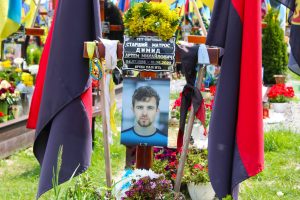By Gina Christian | OSV News
On a sunny afternoon in Lviv, renowned Ukrainian iconographer and artist Ivanka Krypyakevych-Dymyd spent a few hours tending to the grave of her eldest son, Artem.
The 27-year-old Ukrainian soldier, a graduate of Ukrainian Catholic University, was killed by Russian mortar fire in June 2022 during a battle in the region of Mykolaiv and Kherson, in Ukraine’s south. At the funeral, which was held in Lviv’s Garrison Church of Sts. Peter and Paul, Krypyakevych-Dymyd sang her son a final lullaby. He was laid to rest in the military cemetery not far from the church. The university created a scholarship in his honor.
Flowers, flags, rosaries and an image of her son adorn the grave, one of a growing number in the cemetery. Three other fallen Ukrainian soldiers were buried the day OSV News met with Dymyd’s mother at his graveside; hundreds of Lviv residents knelt in the streets as the soldiers’ coffins were carried in procession.
In the cemetery, Krypakevych-Dymyd shared with OSV News insights from her ongoing journey through grief amid war, and how her faith has helped her.
She began the interview — which took place just after the one-year anniversary of her son’s death — with a question.
“Do you know why some of these flags are black and red?” she asked, pointing to the field of gently fluttering banners. “Normally (Ukraine’s) flag is blue and yellow, representing sky and wheat. … But when you put blood on the flag, you receive a black and red result. That is the flag on the battlefield, with the blood of the soldiers. And when Artem died, I put two black and red flags (on his grave), because he lost too much blood.”
She looked over the rows of graves. “So what can I tell you about my brilliant Artem? Because all these guys were brilliant.”
Those slain with her son include “teachers, fathers, poets, actors, historians, managers,” she said. “They only tried to stop this invasion. They were not just soldiers; they were knights.”
Yet even among his peers, Artem always stood out, she admitted.
“He was born on the fourth of July, America’s Independence Day,” she said. “And he grew like lightning; very smart, interested in everything.”

As a member of Ukraine’s Plast scouting organization, Artem quickly earned the nickname “Kurka,” Ukrainian for “chicken,” thanks to his energetic, inquisitive demeanor, she said.
During Ukraine’s 2013-2014 Maidan movement — which saw the populace reject the pro-Kremlin government of the time and decisively reorient the nation toward the European Union — Artem witnessed the Feb. 20, 2014, killings of protestors. Weeks later, he traveled to Crimea to support pro-Ukrainian forces amid Russia’s illegal annexation and eventually joined the Azov and Harpoon battalions.
“You’re a warrior when you fight,” he said in a 2014 interview. “The one who is thrown to the ground but rises again to go on, fight to the end, even if to no avail.”
That steadfast determination ran in his blood: one of his great-grandfathers, priest and violinist Artemiy Tsehelsky, had spent seven years exiled in Siberia under Soviet rule. His other great-grandfather, historian Ivan Krypiakevych, had also suffered Soviet persecution in his career. Artem’s father, Ukrainian Catholic priest Father Mykhailo Dymyd — the first rector of Lviv Theological Academy, the predecessor of UCU — was a chaplain of the Maidan.
Artem, an avid motorcyclist and parachute jumper, traveled to more than 50 countries, and was helping to develop the Ukrainian clothing brand Aviatsiya Halychyny when Russia launched its full-scale invasion on Feb. 24, 2022, a war that has since been declared a genocide in two joint reports issued by New Lines Institute and The Raoul Wallenberg Centre for Human Rights. Artem immediately flew back to his homeland from the U.S., even wearing a bulletproof vest and tactical helmet on the plane to save baggage fees. Upon landing, he headed for the front lines as quickly as possible.
Krypyakevych-Dymyd said she endured “many months of depression” after her son’s death.
“I went to bed and didn’t want to leave,” she admitted.
She was roused out of her isolation by a dream in which a revered spiritual mentor of her and her husband — Cardinal Josyf Slipyj, head of the Ukrainian Catholic Church from 1944 to 1984 and a survivor of the Soviet labor camps — told her she had a choice.
“He said, ‘These are very hard times. You can be weak or be strong. But you have to be strong,'” Krypyakevych-Dymyd recalled.
Amid the pain of her loss — which includes the “10 babies” Artem longed to have and which “will never be born” — she said she has drawn closer to Jesus Christ, literally.
In her recent art, she has drawn the face of Christ at close range, often painting with meager materials that befit wartime austerity — a stick and a few drops of ink or even cosmetics.
The death of her son has placed her firmly at the foot of the cross, she said.
“It’s like immediately you stand near the feet of Christ like this, and when you stay like this, you haven’t any questions for him; no questions,” Krypyakevych-Dymyd said. “He brought me his all — all that he is, his life, his blood. … Christ is here and he’s all.”
She added, “I am only thankful because he chose the best way for my Artem, who did what Jesus said — that when you give the life (you have) for your friends, it’s the best thing that you can do. You have no greater love.”
– – –
Gina Christian is a national reporter for OSV News.
The post ‘Not soldiers but knights’: Catholic mother mourns son and ‘brilliant’ generation slain in Ukraine appeared first on The Central Minnesota Catholic.


















